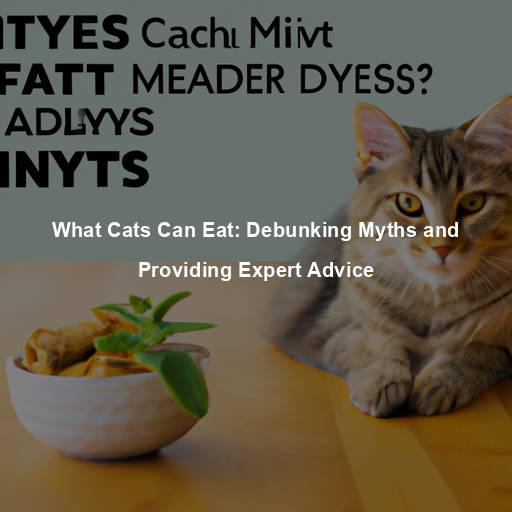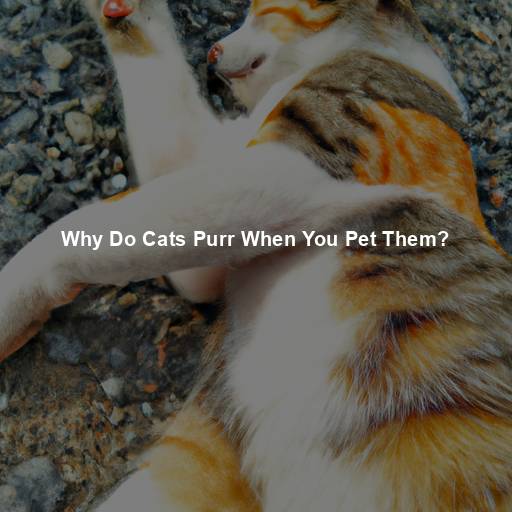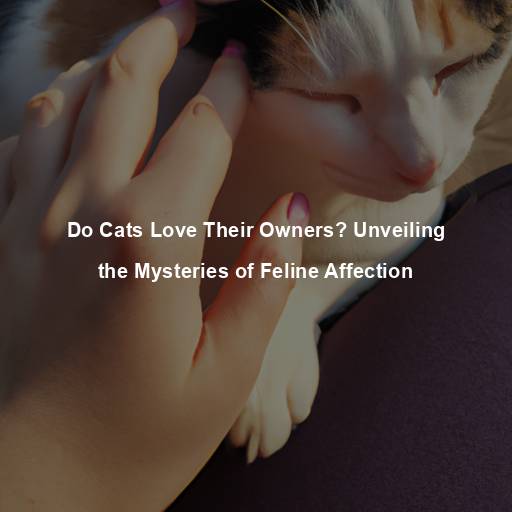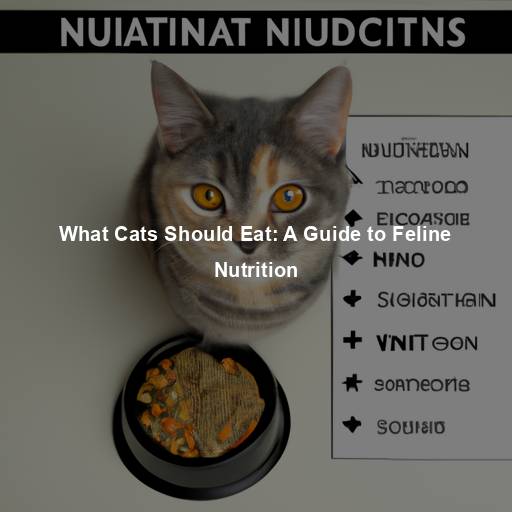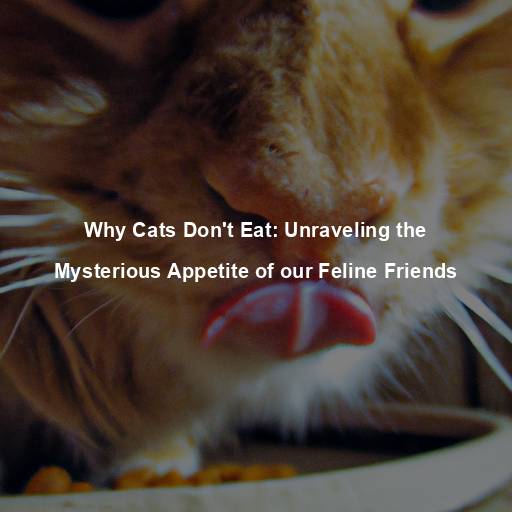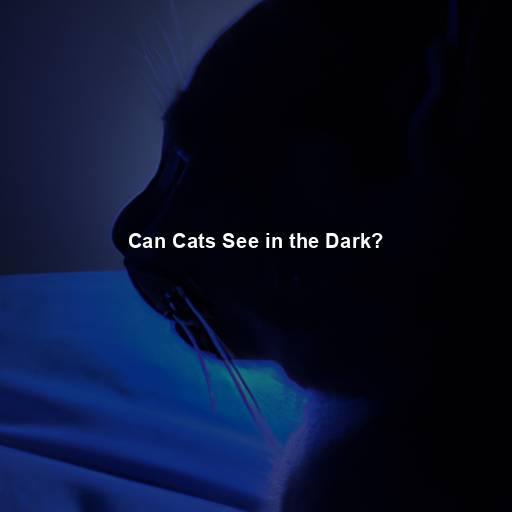What Cats Can Eat: Debunking Myths and Providing Expert Advice
Last Updated on July 22, 2023 by Evan
Contents
- 1 The Feline Dilemma: Can Cats Eat Human Food?
- 2 Debunking Common Myths: What Cats Cannot Eat
- 3 Cat-Friendly Human Foods: What Can Cats Eat?
- 4 Consulting with Your Veterinarian: The Importance of Professional Advice
- 5 Balancing Treats with Nutrition: The 90/10 Rule
- 6 Observe and Adapt: Catering to Individual Needs
- 7 The Joy of Treating: Alternatives to Human Food Treats
- 8 Final Thoughts: Nurturing a Healthy Relationship
- 9 FAQs – What Cats Can Eat Human Food
- 9.1 Can cats eat human food?
- 9.2 What types of human food can cats eat?
- 9.3 Are there any human foods that cats should never eat?
- 9.4 Can cats eat dairy products?
- 9.5 Should I give my cat homemade food?
- 9.6 How should I introduce human food to my cat’s diet?
- 9.7 What should I do if my cat accidentally eats something toxic?
The Feline Dilemma: Can Cats Eat Human Food?
When we talk about our beloved furry companions, it’s natural for their dietary needs to spark some curiosity and confusion among pet parents. One puzzling question that often arises is whether our feline friends can join us in indulging in human food. We all know that cats have their unique dietary demands, but there are a few human treats that can be shared with caution, and that’s what we’re here to unravel. In this illuminating piece, we will untangle the myths surrounding this enigmatic topic and serve you with expert guidance on what human food can be enjoyed by our whiskered pals, without compromising their well-being.
Understanding Feline Nutrition: The Key to a Healthy Diet
Before delving into the specifics of what human foods can be given to cats, it is crucial to understand the basics of feline nutrition. Cats are obligate carnivores, which means that their bodies require a diet primarily composed of animal protein to thrive. Unlike humans, cats have specific dietary needs that must be met to ensure their overall health and well-being.
A balanced feline diet consists of high-quality commercial cat food that is specially formulated to meet their nutritional requirements. These diets are carefully crafted to provide the necessary vitamins, minerals, and amino acids that cats need to thrive. It is important to note that human food should never replace a cat’s regular diet but can occasionally be offered as a treat or supplement.
Debunking Common Myths: What Cats Cannot Eat
Myth 1: Cats Can Consume Dairy Products
One of the most persistent myths surrounding feline nutrition is the belief that cats can consume dairy products such as milk. Contrary to popular belief, most adult cats are lactose intolerant, meaning they lack the necessary enzymes to digest lactose, a sugar found in milk. Feeding cats dairy products can lead to digestive upset, including diarrhea and stomach discomfort. It is best to avoid offering cats milk or other dairy products altogether.
Myth 2: Cats Can Safely Consume Raw Meat
Another misconception that often circulates is that cats can safely consume raw meat. While cats are natural hunters, feeding them raw meat poses several risks. Raw meat can be contaminated with bacteria such as Salmonella or E. coli, which can cause severe illnesses in cats. Additionally, an unbalanced raw meat diet can lead to nutrient deficiencies or imbalances, jeopardizing your cat’s overall health.
Myth 3: Cats Can Eat All Types of Fish
While fish is often associated with cats, not all types are suitable for them. Some fish, such as tuna, contain high levels of mercury, which can be harmful to cats when consumed in excess. Additionally, certain fish may contain thiaminase, an enzyme that can destroy thiamine (Vitamin B1) in a cat’s body, leading to potential health issues. It is best to consult with your veterinarian regarding the types of fish that are safe for your cat to consume.
Cat-Friendly Human Foods: What Can Cats Eat?
While the list of what cats cannot eat may seem extensive, there are several human foods that can be safely offered to cats as an occasional treat. It is important to remember that these foods should only be given in small quantities and should never replace a balanced feline diet. Here are some cat-friendly human foods that you can share with your feline companion:
Cooked Chicken or Turkey
When it comes to treating our feline friends to some protein-packed goodness, cooked chicken or turkey can be a paw-some choice. However, it’s vital to paws and take a moment to prep it properly. Whisk away the skin, bones, and any flavorful additions, ensuring a clean and uncomplicated feast. And just like the way we humans like our meat, make sure it’s cooked through to squash any bacterial concerns.
Cooked Eggs
Cooked eggs can be a nutritious addition to your cat’s diet. However, it is essential to ensure that the eggs are fully cooked to eliminate the risk of salmonella. Scrambled or boiled eggs without any added ingredients are the safest options for cats.
Baby Carrots
Looking for a unique, low-calorie snack to pamper your feline friend? Look no further than baby carrots! Bursting with crunchiness and packed with fiber, these bite-sized treats are the purr-fect choice. But before you serve them up, don’t forget to give those carrots a thorough wash and remove any sharp edges.
Plain Cooked Rice
If you ever find yourself wondering if cats can eat plain cooked rice, the answer is yes, but with caution. As a savvy cat owner, you might consider offering modest servings of this bland grain as an occasional meal or as a brief remedy for feline tummy troubles. However, let’s not catapult rice into the realm of a feline dietary staple, for our furry friends require a predominantly protein-rich menu.
Cooked Salmon or Tuna (in moderation)
While it is true that certain types of fish can be harmful to cats, cooked salmon or tuna can be an occasional treat. Ensure that the fish is boneless and cooked thoroughly to eliminate any potential risks.
Small Pieces of Cooked Vegetables
Certain cooked vegetables, such as green beans or peas, can be given to cats in small quantities. These vegetables provide added fiber and can be a healthy addition to their diet. However, it is important to avoid seasoning or adding any oils or butter to the vegetables.
Plain Yogurt (in moderation)
When it comes to feline nutrition, the dairy dilemma can leave us scratching our heads. But fear not—there is a glimmer of hope that lies within the realm of plain yogurt. In the grand tapestry of cat-comestibles, finding a yogurt sans artificial sweeteners or added sugars may seem like a perplexing quest. However, the presence of live bacteria within this creamy delight can unveil a potential treasure trove of gut health benefits for our enigmatic feline companions.
Consulting with Your Veterinarian: The Importance of Professional Advice
When it comes to sharing our food with our feline companions, it’s important to tread softly and consult our trusted veterinarians before taking the plunge. Cats, being the enigmatic creatures they are, have unique needs that require personalized attention. Age, health conditions, and dietary mandates all play a role in deciphering what nourishment is best suited for our furry friends.
Your veterinarian can provide personalized advice tailored to your cat’s specific needs. They can guide you in developing a well-balanced diet plan that includes both commercial cat food and occasional human food treats. Regular check-ups with your veterinarian are essential to ensure your cat’s nutritional needs are met and to address any concerns or questions you may have regarding their diet.
Onions and Garlic
Onions and garlic, whether raw, cooked, or in powdered form, contain compounds that can damage a cat’s red blood cells, leading to a condition called hemolytic anemia. Even small amounts of onion or garlic can be toxic to cats, so it is best to avoid feeding them any dishes that contain these ingredients.
Chocolate and Caffeine
As a doting pet owner, it’s essential to be aware that our feline friends possess an exquisite sensitivity to certain indulgences that we humans often treasure – like chocolate and caffeine. These intoxicating delights harbor peculiar substances known as methylxanthines, whose effects on our beloved cats can be rather disconcerting. Notably, the repercussions of partaking in these delectable treats may present as a myriad of bewildering symptoms; think rapid heart palpitations, curious tremors, sudden bouts of regurgitation and intestinal mischief, and even harrowing seizures. To preserve the well-being of your cherished feline companion, it is imperative to maintain a safe distance between their purrfectly adorable whiskers and any chocolate or caffeine-containing temptations.
Grapes and Raisins
Grapes and raisins, although harmless to humans, can cause kidney failure in cats. Even a small amount of grapes or raisins can lead to severe health issues. It is advised to keep these fruits out of your cat’s reach.
Alcohol
The well-being of our feline companions is of utmost importance, and we must remain vigilant about their safety. It is imperative to note that cats are highly susceptible to the toxic effects of alcohol, as even the smallest amount can lead to severe liver and brain damage. Therefore, it is our responsibility as pet owners to ensure an alcohol-free environment for our beloved cats, refraining from any temptation that may expose them to harm.
Xylitol
Take note of this perplexing revelation about xylitol – a widespread artificial sweetener known to lurk in a myriad of seemingly innocent sugar-free products like tantalizing gum, mouthwatering candy, delectable baked goods, and astonishingly, even some peanut butter brands. Here’s where things get truly bizarre: once inside a feline’s delicate system, xylitol has the uncanny capability of triggering an alarmingly speedy insulin surge, resulting in an alarming plummet in our furry friends’ precious blood sugar levels, a potentially dire scenario. To shield and safeguard our beloved meowing companions from harm, it is crucial to exercise vigilance, meticulously scrutinizing product labels, and abstaining from sharing any enticing morsels that cunningly contain this hidden danger.
Raw Eggs and Raw Meat
While cooked eggs and meat can be given to cats in moderation, raw eggs and raw meat should be strictly avoided. Raw eggs may contain Salmonella or E. coli bacteria, which can cause severe illnesses in cats. Raw meat poses similar risks and can also lead to nutrient deficiencies or imbalances.
Balancing Treats with Nutrition: The 90/10 Rule
When considering treating your beloved feline friend to some human delicacies, it is of utmost importance to navigate the delicate balance between occasional indulgence and maintaining their optimal nutrition. In this perplexing task, the 90/10 rule emerges as a reliable compass, directing you to keep treats confined to a mere fraction of your cat’s overall dietary intake. By adhering to this principle, you can provide your precious companion with occasional delight while ensuring their wellbeing remains at the forefront.
As pet owners, we always strive to ensure that our furry friends receive the best nutrition possible. Enter the 90/10 rule, a guideline that emphasizes the importance of finding the perfect balance between commercial cat food and those occasional treats that we can’t resist sneaking to our feline companions. By allocating 90% of their diet to nutritionally balanced cat food, we guarantee that they receive all the essential nutrients their bodies crave. The remaining 10%?
Remember, treats should never replace a cat’s regular diet, and they should be given sparingly. It is essential to monitor your cat’s weight and adjust their daily caloric intake accordingly to prevent obesity and other weight-related health issues.
Observe and Adapt: Catering to Individual Needs
While general guidelines can be provided regarding human foods that are safe for cats, it is important to remember that every cat is unique. Some cats may have specific dietary restrictions or health conditions that require a stricter diet plan.
If your cat has any underlying health issues or sensitivities, it is crucial to consult with your veterinarian before introducing any new foods, including human food treats. Your veterinarian can provide personalized advice based on your cat’s individual needs and help you create a diet plan that ensures their optimal health and well-being.
Keeping a close eye on how your furry feline friend responds to different foods is crucial. Cats, like humans, can have specific dietary sensitivities or allergies to certain ingredients, so what may be generally safe for them may not work well for your particular kitty. If you spot any negative reactions or see any unusual changes in your cat’s behavior or overall health after introducing a new food, it’s best to stop feeding it right away and seek professional advice from your trusted veterinarian.
The Joy of Treating: Alternatives to Human Food Treats
When it comes to indulging our furry friends, it’s hard to resist dishing out bites from our own meals. However, it’s crucial to keep in mind that there exists an array of feline-friendly snacks specially crafted to cater to their unique dietary requirements. With a delightful assortment of flavors, textures, and presentations, these treats guarantee a pleasurable and secure way to spoil your beloved cat.
When it comes to choosing the purrrfect cat treats from the supermarket shelves, it can feel like navigating a labyrinth of options. But fear not, feline aficionados! The key is to pounce on those treats crafted with a touch of culinary brilliance – think real meat and fish – while evading the pitfalls of fillers that leave your furball perplexed. As you embark on this epic quest, don’t forget to consider your whiskered companion’s dietary needs and any dietary sensitivities they may have, steering clear of those sneaky sugars and artificial additives along the way.
By opting for cat-specific treats, you can ensure that your feline friend receives a tasty reward that is both safe and nutritionally appropriate. Remember to read the labels, consult with your veterinarian if needed, and offer treats in moderation to maintain a healthy balance.
Final Thoughts: Nurturing a Healthy Relationship
As pet owners, it is our responsibility to provide our feline companions with a diet that supports their overall health and well-being. While cats can enjoy certain human foods as an occasional treat, it is essential to prioritize their specific nutritional needs.
By understanding the risks associated with certain foods, debunking common myths, and consulting with your veterinarian, you can navigate the world of feline nutrition with confidence. Remember, treats should never replace a balanced feline diet, and moderation is key.
Nourishing your cat with love, attention, and a diet tailored to their individual needs will not only contribute to their physical health but also strengthen the bond you share. So, while you savor your meals, feel free to include your furry friend in the joy of treats, knowing that you are providing them with safe and delightful indulgences that enhance their overall happiness.
FAQs – What Cats Can Eat Human Food
Can cats eat human food?
As feline companions, cats often display an inexplicable interest in nibbling on human delicacies. However, not all comestibles are created equal when it comes to our whiskered friends’ dietary needs. While a handful of human foods can be deemed safe, even advantageous, for cats, a vast array of edibles can send their health spiraling into perplexity and chaos. Prior knowledge of the specific human foods that fall under the “feline-friendly” category is of utmost importance before surrendering any morsels from our own plates.
What types of human food can cats eat?
It’s no secret that our feline friends have a curious palate, but when it comes to their dietary needs, things can get a little perplexing. While cats are obligate carnivores and thrive on a meat-based diet, there are a few human foods that can be incorporated into their meals. Cooked, unseasoned meats like chicken, turkey, and beef can be a burst of flavor for their taste buds, while providing them with the essential protein they need. As for some veggie surprises, carefully rinsed vegetables like carrots and green beans can add a touch of variety, although in small amounts. And for those rare moments of indulgence, a slice of banana or melon can make for an occasional treat. Just remember, moderation is key in keeping our curious kitties happy and healthy.
Are there any human foods that cats should never eat?
Cats have a discerning palate, but that doesn’t mean they can indulge in every culinary delight we humans enjoy. It’s crucial to remember that some seemingly innocent foods can turn into menacing foes for our feline friends. For instance, the forbidden onion, garlic, and chives possess the power to wreak havoc on a cat’s delicate red blood cells. Moreover, grapes, raisins, tempting chocolate, the energizing caffeine, the spirited alcohol, and anything offering an excessive dose of salt or sugar are among the never-should-touch catlistic morsels.
Can cats eat dairy products?
While cats may savor the delectable allure of dairy indulgences like milk, cheese, or yogurt, it’s important to tread with caution. You see, our feline friends often grapple with lactose intolerance, rendering their digestive systems perplexed by the sugary substance known as lactose, commonly found in dairy treats. Subjecting cats to such delights might result in a tumultuous ride for their delicate gastrointestinal tracts, manifesting as bouts of tummy troubles like explosive diarrhea or dramatic vomiting. Hence, it is advised to err on the side of caution and explore cat-specific alternatives to ensure their nourishment and contentment.
Should I give my cat homemade food?
When it comes to feeding our feline friends, the homemade route may seem like a tantalizing option. However, we must tread carefully in this realm of furry gastronomy. While the idea of creating meals for our cats may ignite culinary creativity, we mustn’t overlook the importance of nutrition. Our finicky felines have unique dietary needs that may not be fully satisfied by our humble kitchen creations alone. To navigate through this culinary conundrum, it is advisable to consult with a knowledgeable veterinarian who can guide us in crafting a purrfectly balanced diet that meets our beloved cat’s nutritional requirements.
How should I introduce human food to my cat’s diet?
When it comes to treating your feline friend to a taste of the human world, caution is key. Take it slow and steady, mixing minuscule portions of people food with their usual kitty cuisine. Keep a watchful eye for any tummy troubles or unexpected allergies, while ensuring your fur baby’s all-around well-being. If all goes smoothly and your whiskered companion takes it in stride, you might just sneak in the occasional indulgence of human food as a special treat.
What should I do if my cat accidentally eats something toxic?
When your feline friend gulps down something potentially harmful, it’s paramount to swiftly reach out to a veterinarian for expert guidance. In these nail-biting moments, every second counts, as certain foods can pose a grave risk to your cat’s life. Remember to furnish the vet with comprehensive details about the offending substance and diligently adhere to their instructions to safeguard your beloved whiskered companion’s health.

